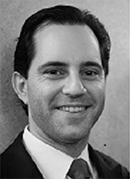
Jordi Casals
Jordi Casals was born in Terrassa in Catalonia, Spain, and had his first musical experiences as Soprano-Soloist of the Boys Choir in Montserrat Abbey near Barcelona. From 1999 until 2003 he studied orchestra- and choir-conducting at the Vienna Conservatory. Since 2003 he has been closely cooperating with Erwin Ortner and the Arnold Schoenberg Choir and worked for several opera productions at the Theater an der Wien and for renowned international festivals. As choirmaster and conductor, he has toured through France, Italy, Germany and Spain. In 2006 he was appointed lecturer for conducting at the Institute for Organ and Church Music at the University for Music and Performing Arts in Vienna. He has been a conductor at the Wiener Hofmusikkapelle since 2015.
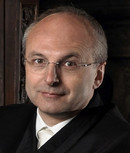
Johannes Ebenbauer
Johannes Ebenbauer comes from Strallegg (Styria) and studied church music at the University of Art in Graz and concert organ at the University of Music and Performing Arts in Vienna. From 1985 to 2005 he worked together with Peter Planyavsky at St. Stephen's Cathedral in Vienna, from 1991 as „Domkapellmeister“ (Director of Music). Ebenbauer has been teaching at the Vienna University of Music since 2002, followed by an appointment as university professor for organ and improvisation in 2013, and in 2020 he was entrusted with the direction of the Institute for Organ, Organ Research and Church Music at the University of Music and Performing Arts in Vienna. From the 2022/23 season, Ebenbauer will be part of the team of conductors of the Vienna Court Music Ensemble.
He accepts invitations to festivals and master classes at home and abroad as organist, improviser and conductor. CD recordings in all his disciplines as well as his activities as organist and curator at Vienna's oldest organ, the Wöckherl organ from 1642 in the Franziskanerkirche, complement his artistic work. He frequently creates compositions for a wide variety of instrumentations, ranging from chamber music to choral works and oratorical forms.
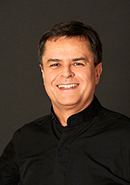
Martin Schebesta
Martin Schebesta was born in Zwettl, in the Northern part of Austria. He studied at the Academy of Music in Vienna and at the Mozarteum Salzburg. In the first years of his musical career he worked as conductor in the Abbey of Zwettl and as a teacher at the J. M. Hauer-Conservatory in Wiener Neustadt. Between 1994 and 2007 he was choral conductor with the Vienna Boys Choir and led numerous tours through Europe, Asia and America. Since 2008 Martin Schebesta has been working as Second Choral Conductor at the Vienna State Opera. In 2018 he became artistic director of the Taiwan National Choir. Schebesta is a guest conductor for several international choirs and orchestras. In 2016 he was appointed as a conductor of the Wiener Hofmusikkapelle.

Mirjam Schmidt
The Austrian conductor Mirjam Schmidt received her training at the Johannes Gutenberg University in Mainz (orchestral conducting with Sergiu Celibidache) and at the University of Music and Performing Arts Vienna: master's degree in church music with a focus on choral conducting with Erwin Ortner and Gregorian chant with Cornelius Pouderoijen (master's degree with distinction, academic master's thesis at the Institute for Cultural Management). She has many years of experience as a conductor in the context of church music (conductor at the Rochuskirche 1996-2005, church music director at the Augustinerkirche in Vienna 2005-2008, guest conductorships with radio and TV broadcasts at St. Stephen's Cathedral since 2011). As an orchestra conductor, she has received numerous international invitations (including Beethoven symphonies, Bruckner Symphony No.4, Mahler orchestral songs). Since 2018 she has been director of the Conservatory of Sacred Music of the Archdiocese of Vienna and was appointed as conductor of the Vienna Court Music Ensemble in 2022.
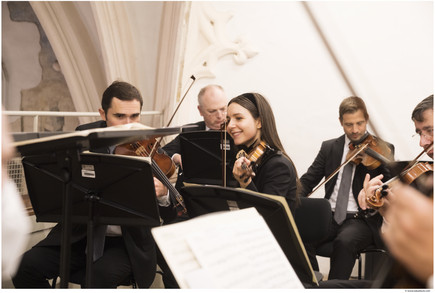
There is perhaps no other musical ensemble more consistently and closely associated with the history and tradition of European classical music than the Vienna State Opera orchestra. All musicians have to be members of the orchestra of the Vienna State Opera and only a few of them become part of the orchestra of the Vienna Court Music Ensemble. Their highly estimated musical tradition and artistic quality enrich the presentation of the musical parts of the Holy Mass nearly each Sunday in the Imperial Court Chapel.
in alphabetic order
Concertmaster: Maxim Brilinsky, Daniel Froschauer
1. Violin: Wilfried Hedenborg, Lara Kusztrich, Benjamin Morrison, Alexandr Sorokow, Holger Tautscher-Groh
2. Violin: Liya Frass, Dominik Hellsberg, Johannes Kostner, Harald Krumpöck, Raimund Lissy, Alexander Steinberger
Viola: James Tobias Lea, Martin Lemberg, Michael Strasser
Violoncello: Wolfgang Härtel
Contrabass: Michael Bladerer, Alexander Matschinegg
Flute: Günter Federsel
Oboe: Josef Bednarik (Orchestra of the Wiener Volksoper), Harald Hörth, Wolfgang Plank
Clarinet: Andreas Wieser
Bassoon: Johannes Kafka (Stage Orchestra of the Vienna State Opera), Harald Müller
Horn: Ronald Janezic, Lars Michael Stransky, Wolfgang Vladar
Trumpet: Reinhold Ambros, Gotthard Eder, Martin Mühlfellner
Trombone: Mark Gaal, Dietmar Küblböck, Johann Leopold Ströcker
Percussion: Anton Mittermayr, Klaus Zauner
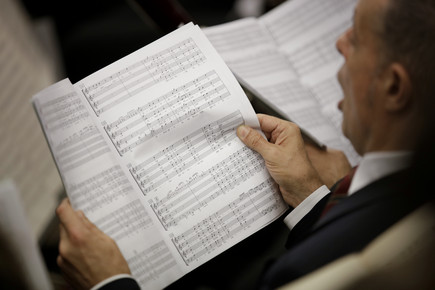
18 men of the Choir of the Wiener Staatsoper / Vienna State Opera form the men’s choir of the Vienna Court Music Ensemble, some of them are also responsible for the Solo parts of the Holy Masses. Among these singers some have already started their musical career as members of the Wiener Sängerknaben / Vienna Boys Choir, singing the soprano or alto parts in the Holy Masses.
in alphabetic order
Tenor: Wolfram Derntl, Jacek Piotr Krzyszkowski, Juraj Kuchar, Günther Martin Müller, Hakki Özpinar, Andre Potgieter, Zsolt Temes, Roland Winkler, Oleg Zalytskiy
Bass: Slaven Abazović, Johannes Gisser, Jens ,Musger, Karl Nebenführ, Ferdinand Pfeiffer, Panajotis Pratsos, Dominik Rieger, Hermann Thyringer, Ion Tibrea
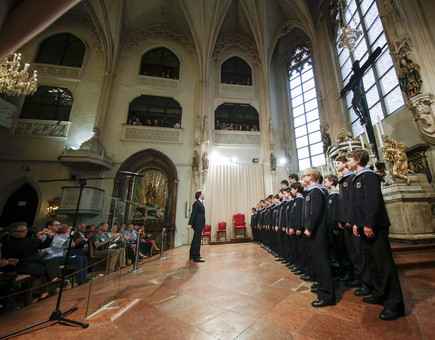
The history of the Wiener Sängerknaben / Vienna Boys Choir dates back to the 15th century when Emperor Maximilian I. moved his court to Vienna including his court musicians and chapel boys. Until 1918, the Boys Choir sang exclusively for the Habsburgian court, in Holy Masses and imperial festivities like weddings or funerals. After the end of the monarchy, in the 1920s, the choir was re-established as a private organisation. The idea was to keep alive the long tradition of highly qualified musical education and intensive training at children’s age in order to prepare a professional career as a musician or singer. Today, there are 100 choristers between the ages of nine and fourteen, divided into four touring choirs. Each choir spends nine to eleven weeks of the academic year on tour. Together, the choirs give around 300 concerts each year, attended by almost half a million spectators around the world. On Sundays, the boys perform with members of the Vienna State Opera orchestra and men's choir in the Imperial Court Chapel. Gerald Wirth, former member of the Boys Choir himself, is the Artistic Director and president of the Wiener Sängerknaben.
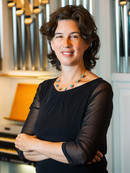
Elke Eckerstorfer
Elke Eckerstorfer, born in Wels (Upper Austria), had her first musical training at the Bruckner Conservatory in Linz. She then studied at the University for Music in Vienna with Rudolf Scholz and Michael Radulescu (organ), Antoinette VanZaber (piano) and Wolfgang Glüxam (cembalo). In 2000/2001 she was guest student at the Conservatoire National Supérieur de Paris in the class of Michel Bouvard and Olivier Latry. Eckerstorfer has given concerts in many European countries and in Japan. She did recordings for the Austrian broadcast, and published several CD-recordings, among these the complete works for organ by Balduin Sulzer, the organ cycle “De profundis” by Hans Stadlmair and a recording dedicated to the Upper Austrian organs. In December 2019 she became organist of Vienna Court Music Ensemble.
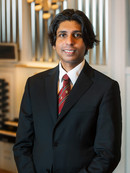
Jeremy Joseph
Jeremy Joseph was born in South Africa, studied privately with Hans Fagius in Copenhagen and furthered his studies under Martin Haselböck at the University of Music in Lübeck and with Jürgen Essl at the State University of Music and Performing Arts in Stuttgart. Apart from a number of international prizes and awards, Joseph’s improvisation CD recorded at the Metropolitan Cathedral of Mexico City was listed as “CD of the year” in 2018 by the prestigious Fono Forum Magazine. Joseph has performed as a soloist at festivals and venues throughout Europe, such as the Schleswig-Holstein Musik-Festival, Nuremberg International Organ Week, as well as in Hong-Kong, Seoul, the USA, Mexico, Brazil and Argentina. As a continuo player he has performed with ensembles such as the Wiener Akademie Orchestra, the Freiburger Barockorchester, the Kammerorchester Basel and the Balthasar-Neumann-Ensemble. In 2019 Joseph was appointed Professor for Organ and Improvisation at the University of Music and Performing Arts in Vienna. In December 2012 he became organist of the Vienna Court Music Ensemble.
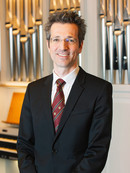
Wolfgang Kogert
Wolfgang Kogert was born in Vienna where he studied with Rudolf Scholz and Martin Haselböck, later on with Jon Laukvik (Stuttgart) and Tomasz Adam Nowak (Detmold). For six years Kogert has teached organ and improvisation at the Hochschule für Musik in Detmold, and he has had a teaching assignment for organ at the University Mozarteum in Salzburg since 2015. Highlights of his concert activities have been appearances as soloist in the concert halls of Brussels, Moscow, Tokyo and Vienna as well as recitals on the famous historic organs of Weingarten, Naumburg and Riga. His repertoire ranges from the Robertsbridge Codex (1330) to contemporary music. Wolfgang Kogert is often engaged as soloist and continuo player by renowned orchestras and is winner of several prizes and awards. In December 2012 he became a member of the Wiener Hofmusikkapelle.
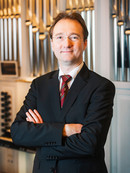
Robert Kovács
The Hungarian organist studied at the Conservatory in Budapest and at the University of Music in Vienna with Herbert Tachezi, Hans Haselböck and Peter Planyavski. After his diploma in 2002 and having won several prizes in international organ competitions he became organist at the Upper-Austrian Abbey St. Florian (2004-2006) and at the dome of the diocese Eisenstadt (2009-2015). As soloist Kovács toured through Europe, to Japan, the USA and Israel. He has been concertizing regularly with acknowledged orchestras such as Vienna Philharmonic Orchestra and Vienna Symphonic Orchestra and choirs such as Wiener Singverein and Arnold Schoenberg Choir. In December 2019 he became a member of the Vienna Court Music Ensemble.
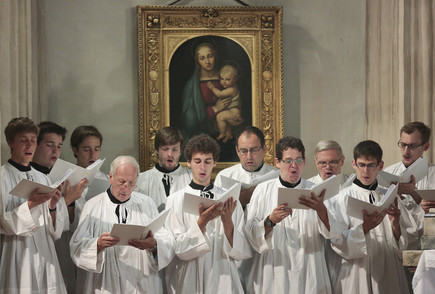
The "Choralschola der Wiener Hofburgkapelle" (Schola of the Vienna Hofburg Chapel), which consists of former members of the Vienna Boys Choir, has been singing the Proprium in the Sunday Services in the Imperial Court Chapel since 1952. Initiated as a Gregorian Chant singer group by Rektor Josef Schnitt, over the years, they have established a vocal ensemble of international reputation searching for a modern interpretation relating to the traditions of the Gregorian Chant. In order to meet the demands of its multiple tasks the Choralschola der Wiener Hofburgkapelle consists of a total of 25 singers, 12 of which are on duty in the regular Sunday liturgy. Standing next to the altar the Choralschola der Wiener Hofburgkapelle sings without a conductor according to the liturgical needs, listening to each other under the lead of three cantores. Since 2023 Antanina Kalechyts has been the artistic director of the ensemble.
Magistra Choralis: Antanina Kalechyts